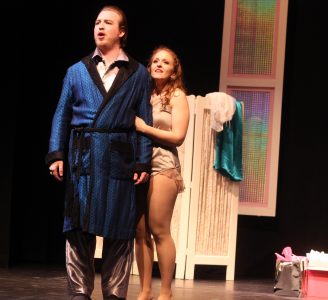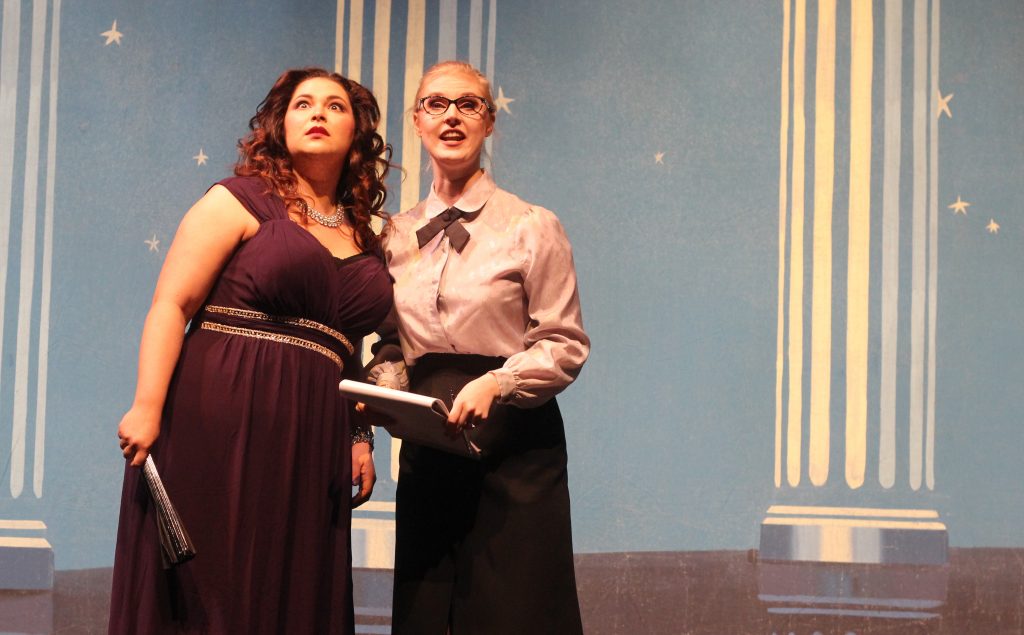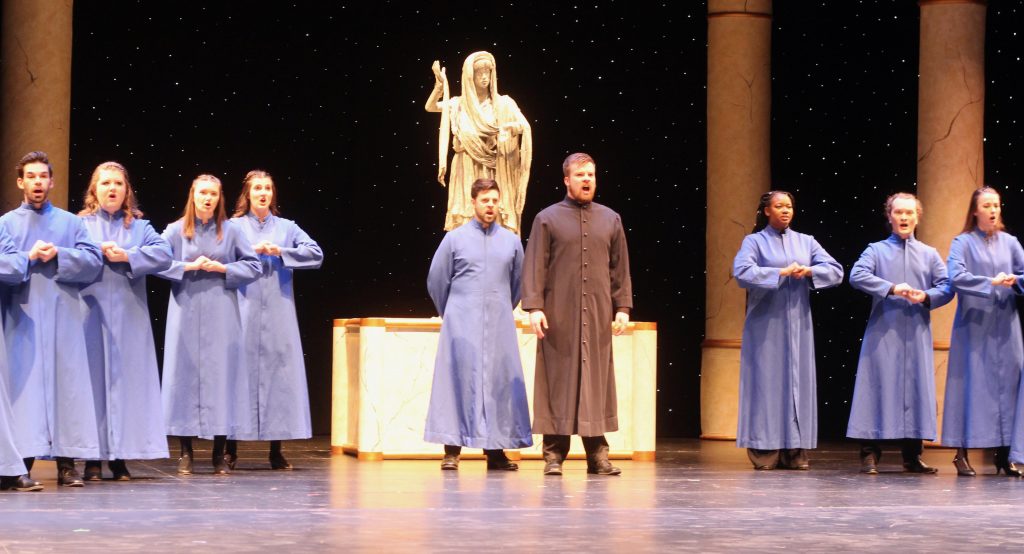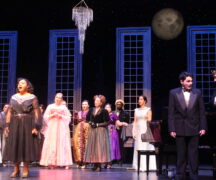By DAVID DUPONT
BG Independent News
George Frideric Handel, the baroque composer of the sacred oratorio “Messiah,” knew how to let his hair down.
That’s evident in the opera “Semele” set to open Friday at 8 p.m. in Donnell Theatre in Bowling Green State University’s Wolfe Center for the Arts. A matinee of the BGSU Opera Theater production will be presented Sunday at 3 p.m. (See ticket information.)

The opera — was first staged as an oratorio so it could be presented during Lent — tells of Semele (Caroline Kouma) a beautiful mortal who uses her sex appeal to get her way with her lover Jupiter (Luke Schmidt). In the end, this turns into a lesson about being careful what you wish for. Her ambitions go up in flames… but even that can’t keep this from having a happy ending with the chorus proclaiming “Happy! Happy! Happy” before the curtain call.
The production is directed with a sure hand by Danielle Wright. The guest director runs Opera MODO in Detroit as well as having her own performing career.
In an interview she explained that she is at home with musical theater as with opera. That shows in this production.

For its ancient provenance, “Semele” has a bright comic touch.
Much credit goes to Kouma’s effervescent performance in the lead role. Her Semele revels in living large as Jupiter’s concubine and revels in the buoyant arias Handel provides.
When the opera opens, though, she’s facing a marriage to Athamas (Julia Gries). She darts away as she approaches the altar. She prays for Jupiter to take her as his own, and he, being the divine horn-dog that he is, obliges. We soon see her as an indulged princess singing of “endless pleasure, endless love.”
Semele’s sister Ino (Eunice Ayodele) is more than happy to comfort the abandoned Athamas. So both sisters apparently have what they want. What could go wrong? Juno (Hillary LaBonte), Jupiter’s wife — that’s what can go wrong.

Juno, played with appealing imperiousness by LaBonte, is not pleased with this latest fling. In an expertly played comic scene, LaBonte’s Juno rages against her husband and Semele. The goddess Iris (Bethany Waldick), who seems to serve as Juno’s executive assistant, reports on the affair complete with photos.
Iris dutifully takes notes though also stashing a photo of Jupiter down her skirt. All the while her face comically reacts as Juno details in dulcet tones her scheme to get revenge.
Then when Jupiter and Iris go to visit Somnus (Aaron Meece) the god of sleep, who not surprisingly just wants to snooze, she strips down to lingerie — there’s a lot of lingerie in the opera — to entice him by giving a hint of the nymph he wants in exchange for his services to aid Juno’s plot.
Meanwhile Semele grows bolder in her position. She wants to become immortal. When Juno in the guise of Ino comes to visit her, she plays on Semele’s growing vanity.
When Juno asks if she does not see her beauty increasing, Semele responds: “I am still a mortal and not sensible of any new perfection.” Her delivery is pitch-perfect in so many ways.
Juno produces an enchanted mirror, then another, and then another and another. Gazing at herself Semele sings: “Myself I shall adore if I persist in gazing.” One can hear the roots of Gilbert and Sullivan here.
Juno (still pretending to be Ino) tells her, that if she sees Jupiter in his true godly form that would make her immortal, knowing it would kill her.
To date we’ve seen Jupiter in full 1980s playboy style in shimmering lounging clothes, and his hair slicked back.

All this seems very contemporary yet the stately strains of Handel’s music never seem anachronistic. It seems natural when these characters open their mouths the music that flows forth soars with baroque elegance. That’s just who these folks are.

The orchestra, conducted by Emily Freeman Brown, underscores the singing with brisk rhythms and carefully modulated color. The music is full of echoes of other Handel work.
Wright said that the version of the opera she’s using at BGSU is the same one she used with her company in Detroit. She excised anything that does not move the story along or has become such an iconic piece that listeners will expect to hear it.
The chorus is used to good effect. Their voices amplify the passions of the leads, but also become collectively characters in their own right whether they are the denizens of the earthly realm or the staff of Jupiter’s den of pleasure. In that last number having returned to earth they have something to celebrate.
All Semele and Jupiter’s coupling was not for naught. She has given miraculous birth to Bacchus, who gives us wine, and the BGSU Opera Theater has given us a production of “Semele” that we can toast.





